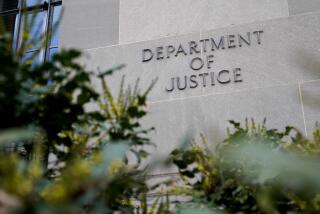U.S. Making List of Grant Violators : ‘Bad Guys’ to Face Government-Wide Ban on Further Aid
WASHINGTON — The Reagan Administration is compiling a master computer list of “bad guys” who can be barred from all $100 billion in government agency grant programs because they have violated terms of one grant, officials said Tuesday.
The controversial new program will cover a wide range of transactions, including grants, cooperative agreements, scholarships, fellowships, loans, subsidies and insurance. It would apply both to recipients of federal funds and those “doing business” with them.
“If you’re a bad guy and do something to one agency, you shouldn’t get funds from another agency,” an Office of Management and Budget official said.
Reasons for Suspension
Under the program, a recipient--individual or institution--may be suspended or barred for any conviction on an offense “indicating a lack of integrity,” including fraud, embezzlement, price fixing and bid rigging, OMB officials said.
Officials at the OMB, which recently published guidelines on the issue, contend that the new plan will “prevent fraud, waste and abuse” in grant programs, but critics charge that it is unfair.
About 20 agencies that provide the $100 billion in grants will participate in the program and are forwarding information to the OMB. The OMB official, who spoke on condition of anonymity, said that the General Services Administration will be in charge of keeping the computer list and that the system is expected to be fully operational by next May.
Various agencies already keep lists of those who violate rules of grants, using them to suspend and “debar,” or prohibit, such recipients from getting additional grants from the agency involved. But, under current law, those same recipients may obtain grants from other federal agencies. The new regulations will prevent that for up to three years.
The new government-wide master list will be modeled on a system already in effect for government procurement; if a firm sells goods and services to a government agency and violates the contract terms, that firm may be barred from doing business with any other government agency.
It is not known how much money will be saved or recovered because of the new system, but several officials said they believe that the amount will be substantial. They cited the experience of the Department of Housing and Urban Development as a yardstick.
“We’ve been in debarment a long time,” said John P. Kennedy, associate general counsel for enforcement at HUD. “We’re enforcement-minded.”
Kennedy said that, from Oct. 1, 1986, through March 31, 1987, 133 recipients of HUD grants were indicted. During that same period, 89 were debarred and $21.7 million was saved and recovered through audits and investigations.
Most violations occur when state and local governments parcel out federal grant money to agencies and private contractors, an OMB official said. “That’s where the fraud and abuse is,” he said.
The new program was authorized by a Feb. 18, 1986, executive order by President Reagan. In regulations published in the May 29, 1987, Federal Register, OMB said that the master list will contain names and “other information” about debarred and suspended grant recipients, as well as information about those whose debarment is pending.
The plan covers main agreements and subcontracts. Under the program, “doing business with a debarred, suspended or otherwise excluded person . . . where it is known or reasonably should have been known that the person is debarred” is reason for the government to suspend business with a main grant recipient.
This means that, if a city receives a federal grant and awards part of it to a subcontractor, city officials must make sure that the subcontractor is not on the list of offenders. “If you fail to check the list, you violate the terms of the grant,” an OMB official said.
Provision Denounced
Critics of the plan denounced this provision as burdensome. “Everybody who handles government funds is ‘deputized’ to enforce these rules against everyone else,” said Shannon Ferguson, coordinator of OMB Watch, a private nonprofit group that monitors OMB.
Ferguson said that “something as broad as this should be legislated, rather than handled by someone in the White House.”
OMB officials rejected this criticism, asserting that Justice Department researchers have determined that the Administration was acting within its jurisdiction.
More to Read
Sign up for Essential California
The most important California stories and recommendations in your inbox every morning.
You may occasionally receive promotional content from the Los Angeles Times.










